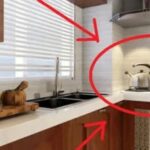The concept of “a house with two doors” has long been considered unfavorable in traditional architecture and cultural beliefs. This belief is especially prominent in the East Asian culture, where the arrangement of spaces and elements in a living environment is thought to influence the flow of energy, or “qi,” which in turn affects the occupants’ fortune, health, and overall well-being.
In the past, our ancestors recognized the potential drawbacks of a house with two prominent doors. This belief is based on the understanding that a house’s entrance plays a crucial role in welcoming and retaining positive energy. When a house has two doors that directly face each other or are aligned in a straight line, it is believed that the desirable “qi” or energy quickly escapes, bringing potential harm to the inhabitants’ wealth and family harmony.

Understanding the Negative Connotations Associated with a House of Two Doors:
From a Feng Shui perspective, a house is seen as a vessel that accumulates and circulates energy, which is vital for the occupants’ prosperity, health, and happiness. Improper placement of doors can result in a swift escape of positive energy, leading to financial losses and family discord.
When the front and back doors are aligned, it is known as “heart-piercing” in Feng Shui terms, suggesting that energy enters and immediately exits, just like wind rushing through an open corridor. This scenario is likened to money slipping away as soon as it enters, resulting in financial struggles.
Additionally, when two main doors directly face each other, it creates a conflict in the energy field, often leading to arguments and disharmony among family members, including spouses and children.
A house with an excessive number of doors or improperly placed doors can also cause energetic instability, making it challenging to accumulate positive energy. This instability can have a direct impact on the physical and mental health of the occupants.
A Modern Perspective on the Superstition:
Beyond the realm of superstition and cultural beliefs, there are practical considerations that support the idea of avoiding a house with two prominent doors. From an architectural and security standpoint, such a design has its drawbacks:
Security Concerns: A house with two large doors in direct alignment offers little obstruction to potential intruders. This setup provides an unobstructed view of the interior, making it easier for unwanted visitors to plan their entry and escape.
Lack of Privacy: The presence of two main doors creates a sense of openness that may be undesirable for those who value their privacy. This setup can make it challenging to create a cozy and secure environment for the occupants.
Furniture Arrangement Challenges: The need to maintain a clear path between the two doors can hinder the placement of furniture and interior design. This restriction may result in an imbalanced or awkward layout, detracting from the aesthetic appeal of the space.
Strategies to Mitigate the Negative Impact of a House with Two Doors:
It is important to note that having two doors does not necessarily spell disaster. With thoughtful adjustments and remedies, the potential negative effects can be minimized:
Break the Straight Alignment: Introducing partitions, room dividers, or strategically placed furniture can help disrupt the straight path between the two doors. This allows the energy to slow down and circulate within the house rather than rushing out.
Distinguish Between Main and Secondary Doors: If one door is designated as the main entrance and the other as a secondary or back door, ensure that the main door is more prominent, welcoming, and easily identifiable. The secondary door should be smaller and less frequently used, avoiding a direct confrontation with the main entrance.
Implement Angled or Offset Designs: In modern Feng Shui practices, arranging doors at angled or offset positions can effectively prevent the “heart-piercing” effect while maintaining adequate lighting and ventilation within the house.
The saying, “it’s better to be safe than sorry,” encapsulates the wisdom behind the aversion to a house with two doors. This belief is not about blind superstition but rather a thoughtful observation of the impact that architectural choices can have on our daily lives. A house is a long-term commitment, and poor design choices can lead to years of discomfort and misfortune.
In conclusion, the saying, “the ancients feared a house with two doors,” highlights the importance of maintaining a balanced and harmonious flow of energy within a living space. Whether you subscribe to Feng Shui beliefs or not, opting for a design that avoids direct confrontations between doors or implementing remedies when necessary, demonstrates a wise respect for your home and the well-being of your family.
Disclaimer: This article is based on traditional beliefs and cultural perspectives. While some may find value in these practices, others may have differing opinions. It is essential to form your own judgment and consult professional advice when making important decisions regarding your living environment.
The Biggest Mistake Homeowners Make With Shoe Storage: A Costly and Unlucky Blunder
In the realm of feng shui, the main entrance holds immense significance as the first line of defense against negative energy and a conduit of positive energy for the occupants. Its placement is pivotal; any deviation from the optimal arrangement may disrupt the flow of good fortune, prosperity, and even the well-being of the household.





































